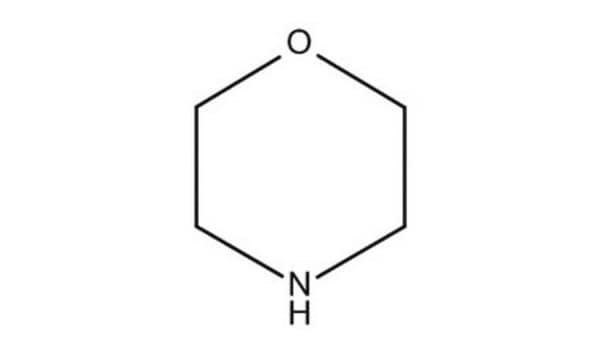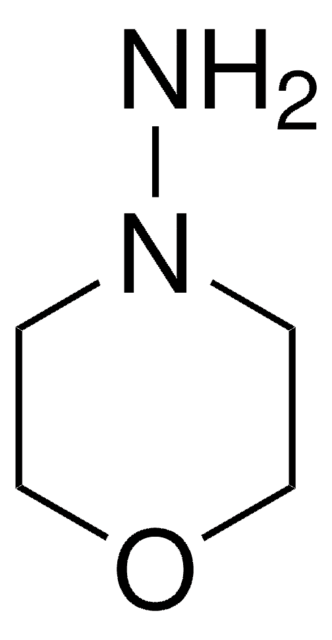134236
Morpholine
ReagentPlus®, ≥99%
Synonyme(s) :
Tetrahydro-1,4-oxazine
About This Item
Produits recommandés
Densité de vapeur
3 (vs air)
Niveau de qualité
Pression de vapeur
31 mmHg ( 38 °C)
7 mmHg ( 20 °C)
Gamme de produits
ReagentPlus®
Pureté
≥99%
Forme
liquid
Température d'inflammation spontanée
590 °F
Limite d'explosivité
10.8 %
Indice de réfraction
n20/D 1.454 (lit.)
Point d'ébullition
129 °C (lit.)
Pf
−7-−5 °C (lit.)
Densité
0.996 g/mL at 25 °C (lit.)
Groupe fonctionnel
ether
Chaîne SMILES
C1COCCN1
InChI
1S/C4H9NO/c1-3-6-4-2-5-1/h5H,1-4H2
Clé InChI
YNAVUWVOSKDBBP-UHFFFAOYSA-N
Vous recherchez des produits similaires ? Visite Guide de comparaison des produits
Description générale
Morpholine is a cyclic amine that serves as a solvent, corrosion inhibitor, and chemical intermediate.
Application
Informations légales
Mention d'avertissement
Danger
Mentions de danger
Classification des risques
Acute Tox. 3 Dermal - Acute Tox. 3 Inhalation - Acute Tox. 4 Oral - Eye Dam. 1 - Flam. Liq. 3 - Repr. 2 - Skin Corr. 1B
Code de la classe de stockage
3 - Flammable liquids
Classe de danger pour l'eau (WGK)
WGK 1
Point d'éclair (°F)
87.8 °F - closed cup
Point d'éclair (°C)
31 °C - closed cup
Équipement de protection individuelle
Faceshields, Gloves, Goggles, type ABEK (EN14387) respirator filter
Faites votre choix parmi les versions les plus récentes :
Déjà en possession de ce produit ?
Retrouvez la documentation relative aux produits que vous avez récemment achetés dans la Bibliothèque de documents.
Les clients ont également consulté
Notre équipe de scientifiques dispose d'une expérience dans tous les secteurs de la recherche, notamment en sciences de la vie, science des matériaux, synthèse chimique, chromatographie, analyse et dans de nombreux autres domaines..
Contacter notre Service technique











